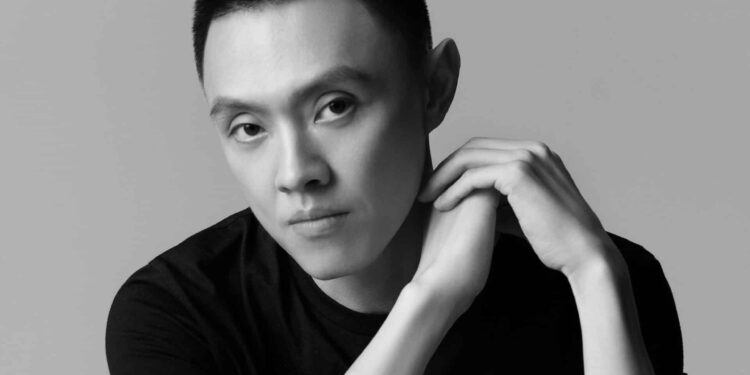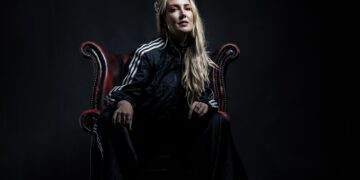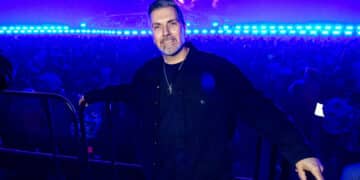Vincent Rooijers aka DROELOE says the reception of The Art Of Change has been “kinda’ strange, but in the best way.”
DROELOE has been in the scene for a decade, and a lot has happened in that time. Musicians are bound to grow, often in unpredictable ways. Originally a duo, DROELOE is now a solo act consisting of Vincent Rooijers, and The Art Of Change is his first album without Hein Hamers. The duo was “pretty much just messing around” when they started DROELOE, and they had no idea what was yet to come. Yet in 2023, The Art Of Change may just mark the breakout year for DROELOE.
Early on, DROELOE managed to score an official remix of a Selena Gomez and Charlie Puth track. While this was nothing like the music they intended to create, it was an important moment, providing exposure and momentum to the nascent act. Through the years, their sound has always been hard to box into any specific genre, which some found appealing and others may have found frustrating. In the end, though, that diversity of style is likely what has kept the act fresh and allowed for growth over the years.
In addition to The Art Of Change, 2023 has seen DROELOE tour with San Holo. The album has been well received, and the tour, still ongoing, has been successful as well. We dropped in during one of the stops to talk about the new album, evolution of the DROELOE sound, and more.
Stream DROELOE’s The Art Of Change on Spotify, and read on below for the full interview!
Hey Vincent, thanks for chatting with us today! How have the new album and recent live shows been received?
Thanks for having me! It has been kinda’ strange, but in the best way! I created this album in a very different order than I’ve done with bigger bodies of work in the past. I started with the ideas and intentions that I wanted to convey with the songs before I wrote the music, instead of “feeling what the story should be about” when the songs were halfway done already (which is what I have done more in the past). I did it this way because I really needed to become a more active participant in my own change and growth, and working these ideas and intentions into music was my way of getting closer to that. I guess it sometimes didn’t feel like I was making this album for the project DROELOE but more for myself, which made all the (often deeply profound!) reactions from fans a little unexpected but therefore even more humbling. All and all, I’m very proud and incredibly grateful!!
Funny enough, the way the show came about was very similar in this working backwards sense; I created the 90-minute medley of old and new songs first, got a good grip on the technical elements of the playback rig right before full production rehearsals started, and really got into the performative elements during final rehearsals and the shows themselves. I wanted to be reliant on mostly improvisation and therefore exploration while on stage because I felt I needed the challenge. It’s been an amazing, although tough, experience from which I can honestly say I learned a lot, and I can’t wait to do more of that.
When asked previously about genres, you’ve struggled to categorize your music, noting that you take inspiration from many different places. Isn’t that how it should be? Shouldn’t music be unique and often unable to fit into predefined categories?
Well, in my opinion, yes and no. It depends on what you use it for. To me, music is as much a language as any other form of it, and language has to be recognized in order for it to be understood.
So when you take the English “genre” of language for instance, you’ll clearly see the difference between excerpts from The King James Bible and excerpts from the manual that came along with your vacuum cleaner, but if you are not acquainted with the English genre of language, they will look pretty much the same. What these aforementioned English texts are conveying is radically different, of course: When you have English as your first language you know this because it’s your favorite genre and you know the subtle nuances.
But what if the thing that you want to convey (or consume) is hard to bring into words in one genre, but the linguistic structure of another is more efficient? Some texts are not fully translatable into English and are therefore mysteriously or arbitrarily translated, resulting in a pale imitation of the initial intent. The Qur’an, Sufi poetry, the Egyptian Book of the Dead, and the Tao Te Ching are a few examples of that: immensely and incredibly rich in original form, but a mere description of a song when translated. I wish I was versed enough in those genres to fully grasp their depth.
Apart from that, every individual has their own relation to the language(s) they speak and know, a relationship that is built on all the cumulative experiences they’ve had with it/them. This is where the importance of uniqueness comes into play, in my opinion. The poems by Edgar Allen Poe reflect a completely different set of experiences than the poetry of Jim Morrison, for instance. They are their own genre because of it; they poured themselves into it. However, this doesn’t mean that I would personally want to just read their work because I’m such a big fan of the genre. Sometimes I just want to put on a lo-fi playlist to make my house a bit more cozy, listen to some DnB to get me pumped up, or just read the manual for the vacuum I just bought so I can clean my house more efficiently.
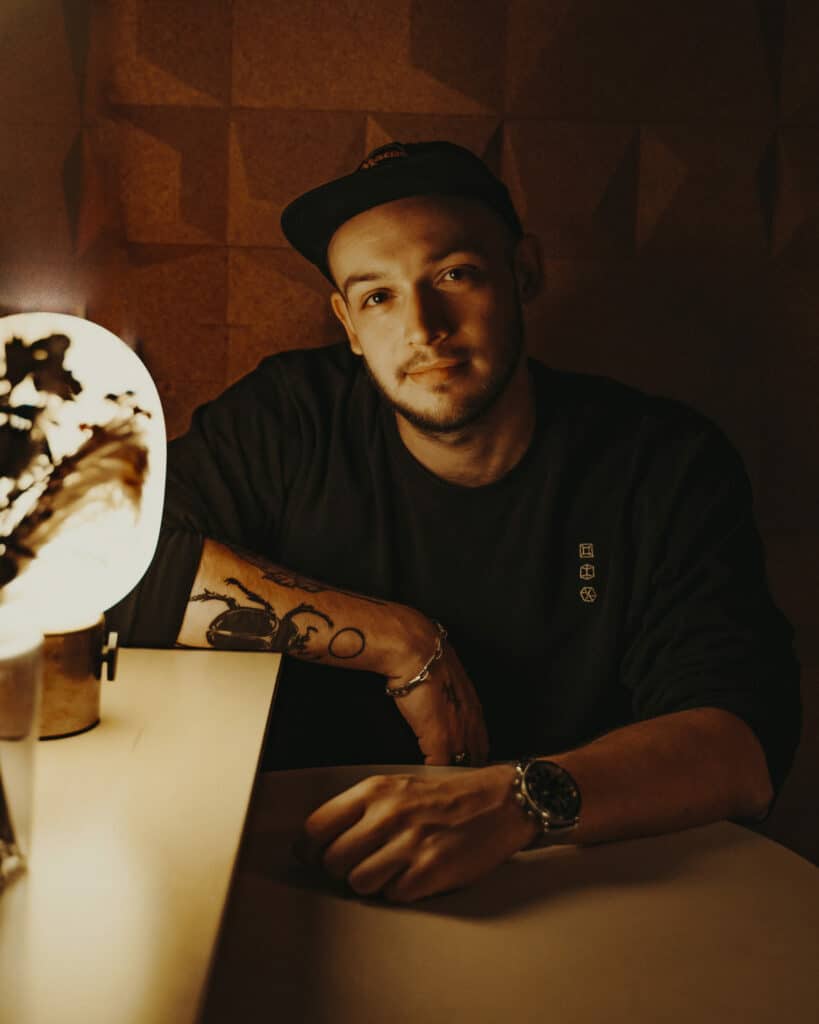
That said, there are elements of breakbeats and drum and bass in The Art Of Change. Unlike the contemporary future bass category often connected to your music, breaks and DnB harken back to the origins of electronic music. Do you think we’re in a nostalgic period seeking to relive the early days?
First of all, I love these questions, and yes I think that could very well be part of the reason why. However, in my opinion, it could also be a romanticization of better times in the past, something that is easier than imagining a preferable future situation because it is less abstract and more easily approachable. It could also be that the BPM and intensity is steadily going up in a lot of genres, with a higher BPM and intensity coming back into fashion because they reflect our increasingly chaotic and polarized society. I really don’t know. Fun subject to ponder about, though, especially when not taken too seriously. I’m enjoying it while it lasts.
The progression of your releases over time, previously as a duo and now as a soloist, seems to be telling your life story through music. Am I correct in saying your growth as a person and as an artist are inextricably tied, and thus told through your music?
Definitely to a degree, yes!! And wholeheartedly with my latest album. From the lens of my current personal beliefs, there is a catch to that though; as soon as you start to narrate your own story (in a diary, in any artistic language, in therapy sessions, or even through the daily dinner table summaries of your day) you’ll find over time that the words you use to do so have an impact on the story you experience. This last album was in a way an effort to use specific words to hopefully change my experience instead of just reflecting it.
But then again, Hein Hamers and I were pretty much just messing around when we started DROELOE together. we used to say to each other often, “We’ll see how far we can push this shit!” (in Dutch: “we kijken wel waar het schip strand!”). I feel like touring has matured us both a lot, and we ended up leaning more toward self-exploratory subjects because of that.
This was only amplified when I became a solo act. “Am I, as one person, still worthy to continue this project seeing that the visual element was such an important part?” I found my personal answer to that question through a lot of soul searching and eventually found the courage to change. So yes, this latest chapter is completely tied to my personal growth. This is not necessarily the only way I will move forward; I view DROELOE as a companion project through which I can explore sound, ideas, and myself, but not always necessarily at the same time. Growth and expansion of awareness are, however, core elements that I will hopefully continue to get out of it moving forward. And if other people resonate with that, that’s awesome, but they wouldn’t be following my life’s story, they would hopefully be exploring their own.
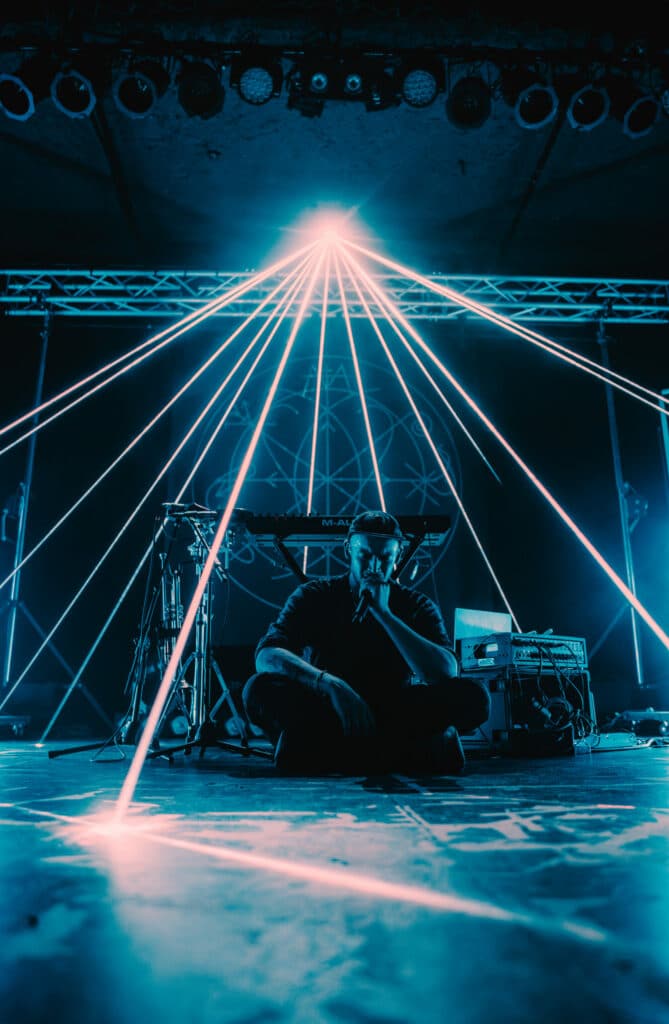
How is life on the road for you? Is touring a necessary evil, or something you embrace?
It teaches, in a lot of ways, and it’s incredibly humbling to meet people who love what I do. This has contributed a lot to my personal growth, but I also need new life lessons and more headspace to tackle the ones I’ve been putting off. I want to explore different ways to connect with fans in real life as well. Less is more for me in the context of touring, I have noticed, because I need more sustainable consistency in my life to achieve the things I want out of this crazy journey from birth to death.
Many artists struggle to find work-life balance while touring. What do you do aside from your shows to gain an appreciation for travel while also remaining grounded in your personal life?
Great question, I will let you know when I find out.
Speaking of early career, you remixed Selena Gomez and Charlie Puth seemingly before even hitting the public scene. How did that happen so early on? And was it a blessing or a curse to dabble in Top 40?
Haha! Well, I believe we were very lucky to land that remix, and it was my management team (specifically Jeffrey Yau, if I remember correctly) who arranged that opportunity back in those days. Maybe the supposed up-and-coming momentum around the project did the trick, or maybe Jeff has always had great connections from the start. I don’t know, probably a bit of both? And it has actually been a blessing. I feel like it has led to opportunities we wouldn’t have had otherwise. And even though the song is not really representative of my music and still #1 in my artist spotlight, I don’t hate it when I listen to it so I’m not really mad at it.
Your parents were jazz musicians and that influenced you early on. However, your early music was far afield from jazz, and now, as your career has matured, you are introducing more live instruments. Are you calling back to your roots and their influence?
Interesting, yeah I might be! Albeit more subconsciously than actively if that is, in fact, the case. Fun thought though, I might keep it!



